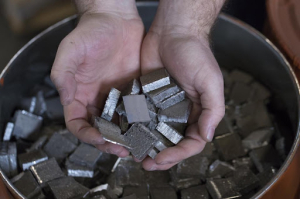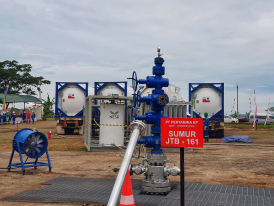Indonesia eyes seaweed-based biofuel as key to US$12 B green economy
Indonesia is setting its sights on seaweed downstreaming as a strategic measure toward building a green energy economy, with the potential to turn the marine commodity into third-generation biofuel.
With vast tropical coastlines, the country is already one of the world’s largest producers of seaweed, and now aims to unlock over US$12 billion (Rp195.7 trillion) in economic value through advanced processing and industrial applications.
Stella Christie, Indonesia’s Deputy Minister for Higher Education, Science, and Technology, emphasized that seaweed is one of 28 key commodities prioritized in Indonesia's downstream agenda. However, she noted that scientific research on seaweed remains limited, holding back the country’s ability to extract higher value from its production.
“We are the world’s largest tropical seaweed producer. We must claim this market,” Stella said at the National Symposium “Sumitronomics and the Direction of Indonesia’s Economy,” held by Katadata in Jakarta on Tuesday, June 3, 2025.
According to Stella, Asia accounts for 97 percent of global seaweed production, with Indonesia outpacing countries like the Philippines, Malaysia, Zanzibar, and China in tropical seaweed output. Seaweed-derived biofuel, considered a third-generation renewable energy source, offers a promising solution for energy resilience and carbon reduction.
To support this vision, the Ministry of Higher Education, Science, and Technology is exploring international research partnerships. Collaborations are underway with institutions such as Mataram University, University of California, Berkeley, Beijing Genomics Institute, and the Indonesian Employers Association (Apindo) to establish a national seaweed research center.
Blue economy to climate action
The idea of seaweed industrialization is not new. In May 2024, then Coordinating Minister for Maritime and Investment Affairs Luhut Binsar Pandjaitan projected that seaweed downstreaming could generate up to US$19 billion (Rp310 trillion) by 2030.
Luhut also proposed the formation of a dedicated seaweed task force to integrate seaweed development into climate change mitigation strategies and blue economy policies.
“The UN already has programs on seaweed. So I suggested, why not create a dedicated task force for seaweed? It has a big impact on climate change. This is the key to the blue economy,” Luhut said in an October 2024 Instagram post.
As Indonesia moves forward with its energy transition and economic diversification, seaweed may emerge not only as a low-emission fuel source, but also as a sustainable economic driver with global relevance.
Already have an account? Sign In
-
Start reading
Freemium
-
Monthly Subscription
20% OFF$29.75
$37.19/MonthCancel anytime
This offer is open to all new subscribers!
Subscribe now -
Yearly Subscription
33% OFF$228.13
$340.5/YearCancel anytime
This offer is open to all new subscribers!
Subscribe now







